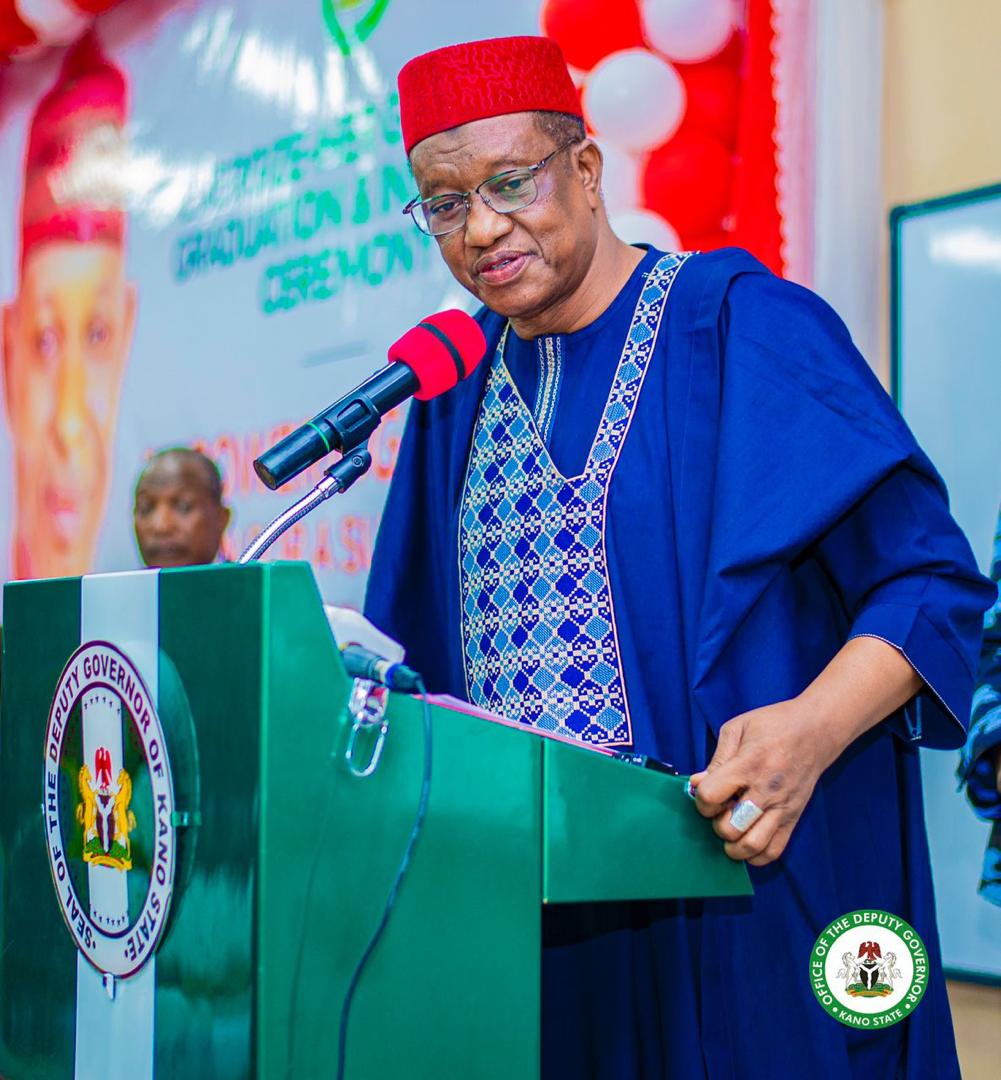By Mustapha Salisu
Governor Abba Kabir Yusuf of Kano State has reaffirmed his administration’s commitment to advancing the Sustainable Development Goals (SDGs), particularly Goals 7 and 13, which advocate for affordable and clean energy and urgent action to combat climate change and its impacts.
The Governor made this pledge at the graduation and induction ceremony for women trainees of the “Energize-Her-Gida-Gida” initiative, organized by the Centre for Renewable Energy and Sustainable Transition (CREST) at Bayero University Kano.
Represented by his Deputy, Comr. Aminu Abdussalam Gwarzo, the Governor acknowledged the crucial role these women are playing in reducing the state’s carbon footprint through the production of biogas, clean cooking stoves, and solar designs.

Photo Credit: Sadiq Khalifa, Press Unit, Office of the Deputy Governor of Kano State
He emphasized that these efforts align with his administration’s vision of positioning Kano as a model for sustainability, not only in Nigeria but across Africa.
Governor Yusuf also highlighted the event’s theme, “Empowering Women for a Sustainable and Inclusive Future,” underscoring the importance of equipping women with technological skills stressing that such empowerment has far-reaching benefits for families, communities, the state, and the nation.
The Governor encouraged the graduates to move forward with confidence, recognizing them as essential change-makers in the global fight against climate change.
He also urged the Centre for Renewable Energy and Sustainable Transition (CREST) to translate renewable energy terminology into Hausa to make it more accessible for students and the wider community.

Photo Credit: Sadiq Khalifa, Press Unit, Office of the Deputy Governor of Kano State
Engr. Yesmin Mukhtar, Senior Special Assistant to the Governor on Women Education and convener of the “Energize-Her-Gida-Gida” initiative, explained that the program is designed to educate, inspire, and empower women in every household.
She emphasized the initiative’s commitment to equipping the next generation of women with knowledge and skills in renewable energy and evolving technology, aiming to make them agents of change within their local communities and contribute to the socio-economic development of Kano State.
Speaking earlier, the Emir of Kano, Dr. Muhammadu Sunusi Lamido II, noted that renewable energy is important in this era of climate change as emissions from cooking alone contributes 2/100% of greenhouse gases and 25/100% of black carbon emissions.

Photo Credit: Sadiq Khalifa, Press Unit, Office of the Deputy Governor of Kano State
He noted the stove developed by the students will contribute in reducing both emissions mentioned above and will help in reducing deforestation and promote biomass and biodiversity.
In his remarks, the Vice-Chancellor of Bayero University Kano (BUK), Prof. Sagir Adamu Abbas, represented by the DVC for Research and Development, Prof. Abdullahi Sule Kano, emphasized that the Centre for Renewable Energy was established to equip youths with skills relevant to the digital and technological revolution in renewable energy.
He called on the Kano State Government to strengthen tertiary institutions to promote education among the youth, noting that a large portion of the country’s youth remain uneducated, posing a significant risk to the nation.
Prof. Nasir Isa Fagge, Director of the Centre, added that the Centre was created to address Bayero University Kano’s energy needs and has already secured grants that led to the installation of a 1-megawatt solar system at BUK’s Old Campus.
He expressed confidence that the Centre is well-positioned to equip Kano’s indigenes with the technical skills needed to transform resources into finished products, enabling them to contribute to their country’s development rather than becoming neo-slaves working in foreign countries.

Photo Credit: Sadiq Khalifa, Press Unit, Office of the Deputy Governor of Kano State


